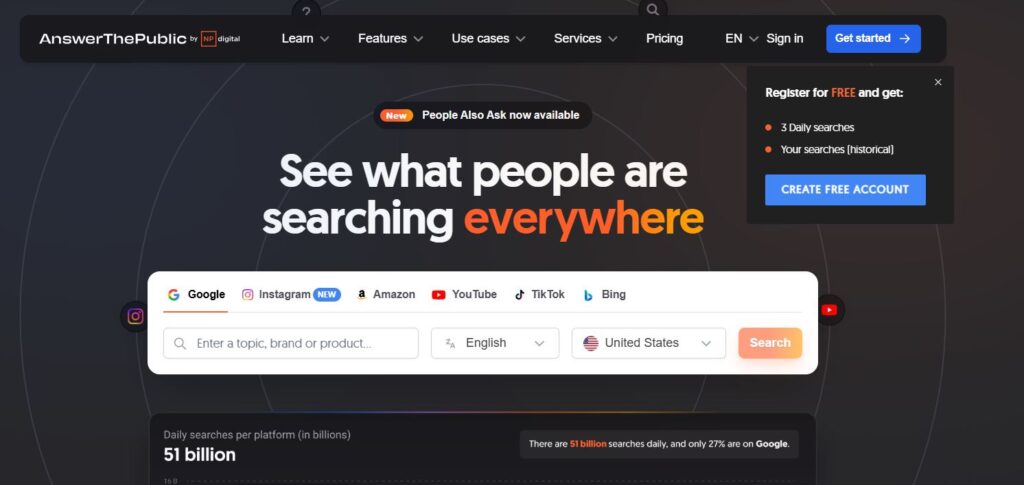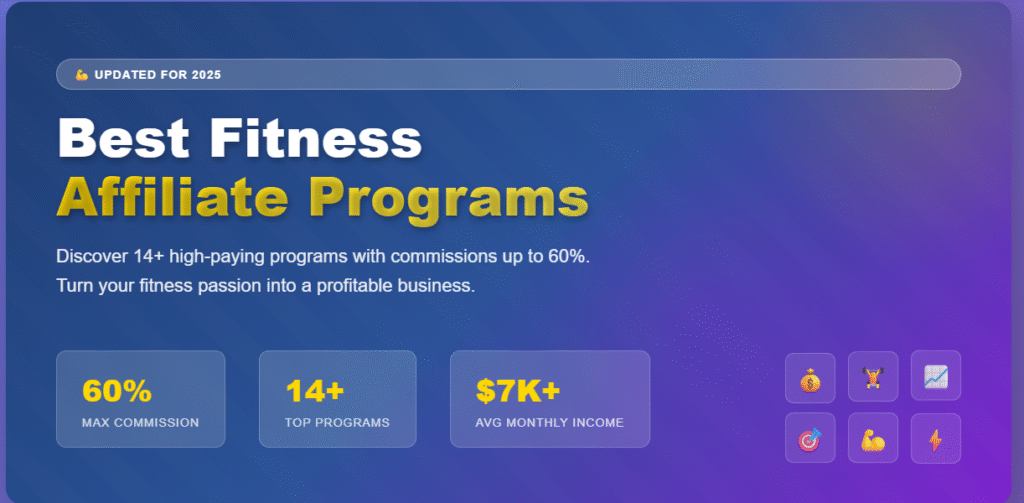Answer the Public has been a go-to tool for content marketers and SEO professionals looking to uncover the questions their audience is asking. With its distinctive visual approach to displaying search queries and question-based keywords, it’s helped countless marketers create content that directly addresses user intent.
However, as digital marketing evolves, so do the needs of marketers. So if you’re looking for more comprehensive data, better pricing options, additional features, or simply want to explore what else is available, here are some alternatives to Answer the Public
What Makes a Good Answer the Public Alternative?
Here are the key criteria we used to evaluate each option:
Question-based keyword research is the core functionality you need. The tool should effectively surface questions and long-tail keywords that reflect actual user queries.
Search volume data helps prioritize which questions and keywords to target first.
User-friendly interface you should be able to quickly navigate the tool and extract insights without a steep learning curve.
Multiple search engines and platforms provide broader coverage beyond just Google, including YouTube, Amazon, and other relevant platforms.
Export capabilities allow you to save and share your research with team members and integrate findings into your workflow.
Pricing accessibility the tool fits within your budget, whether you’re a solo blogger or part of a large enterprise team.
| Tool | Question Research | Search Volume | Export Options | Free Tier | Starting Price | Best For |
|---|---|---|---|---|---|---|
| SEMrush | ✓ | ✓ | ✓ | ✗ | $119.95/month | Agencies |
| Whazzuup | ✓ | ✓ | ✓ | ✓ | $9/month | Affiliate bloggers & Solopreneurs & creators |
| Ahrefs | ✓ | ✓ | ✓ | ✗ | $99/month | SEO professionals |
| AlsoAsked | ✓ | ✗ | ✓ | ✓ | $15/month | FAQ content |
| KeywordTool.io | ✓ | Limited | ✓ | ✓ | $89/month | Multi-platform creators |
| Soovle | ✓ | ✗ | ✓ | ✓ | Free | Budget users |
| QuestionDB | ✓ | ✗ | ✓ | ✓ | $12/month | Community insights |
| Google Keyword Planner | Limited | ✓ | ✓ | ✓ | Free | Google Ads users |
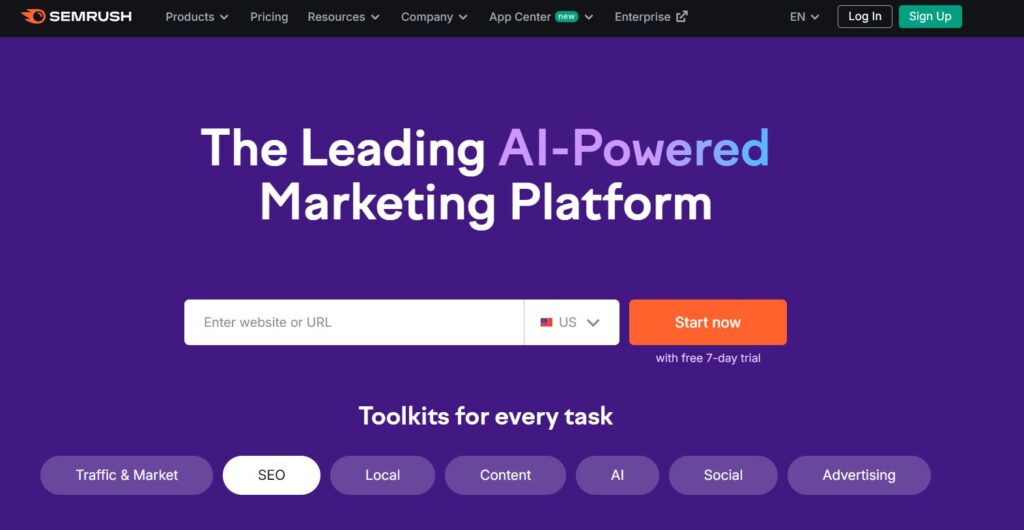
SEMrush is a professional-grade SEO and marketing suite that offers robust question research capabilities through its Keyword Magic Tool and Topic Research features. It’s particularly strong for users who need comprehensive competitive intelligence alongside their keyword research.
Key Features:
- Keyword Magic Tool with advanced question filtering
- Topic Research tool for content ideation
- Competitor content analysis and gap identification
- Position tracking and SERP analysis
- Social media and PPC research capabilities
- Content audit and optimization suggestions
Pricing: SEMrush starts at $119.95/month for the Pro plan, with Business ($229.95/month) and Enterprise (custom pricing) options available.
Best For: Digital marketing agencies, in-house marketing teams, and SEO professionals who need comprehensive competitive analysis.
Pros: Extensive database, advanced filtering options, comprehensive competitive intelligence, excellent customer support.
Cons: Higher price point, steep learning curve for beginners, can be overwhelming for simple keyword research needs.
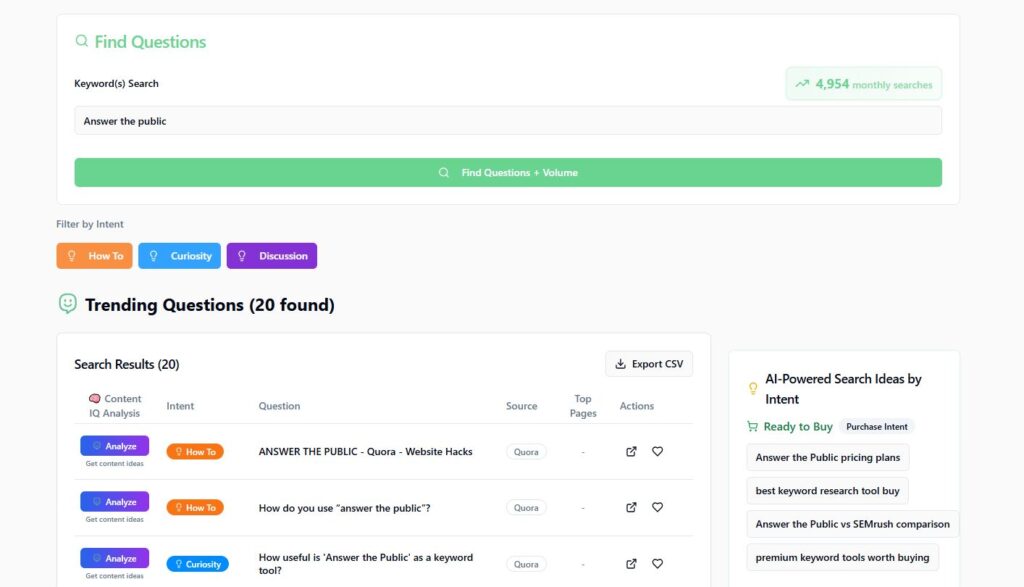
Whazzuup is a newer tool designed specifically to help creators and marketers surface high-intent questions from real users across Reddit and Quora. Unlike traditional keyword research tools that rely solely on Google autocomplete or volume data, Whazzuup focuses on actual conversations happening in online communities — making it especially useful for bottom-of-the-funnel content and affiliate marketing.
Key Features:
- Curated questions pulled from Reddit and Quora combines Google rank and search volume
- Intent scoring system to prioritize threads with buying signals
- “Content IQ” shows where and how to distribute your content
- Save searches and managed content creation lifecycle
- Built-in reply generator to help you respond authentically and promote your content
- No need to chase keywords — start with the questions your audience is already asking
Pricing: Whazzuup offers a free plan with limited saves. Premium starts at $9/month with additional search credits and features.
Best For: Affiliate bloggers, solo creators, and marketers who want to create and distribute question-led content without relying on SEO.
Pros:
- Focused on real user intent, not just keywords
- Surfaces content distribution opportunities automatically
- Lightweight, fast, and easy to use
- Built for Reddit/Quora-driven traffic and conversions
Cons:
- Not a full SEO suite – designed more for distribution than technical SEO
- Currently limited to Reddit and Quora. Others are coming soon.
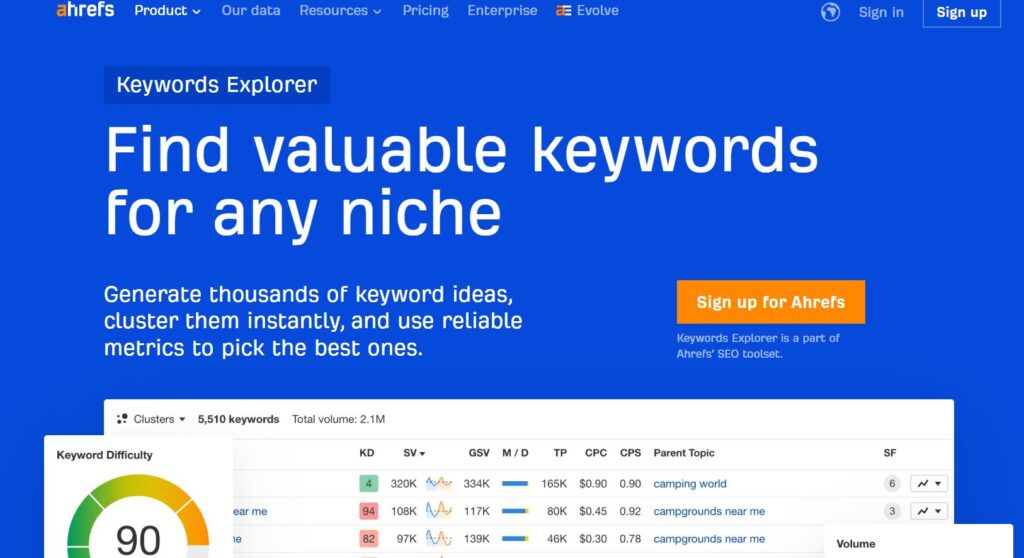
Ahrefs has built a reputation as one of the most comprehensive SEO toolsets available, and its Keywords Explorer includes powerful question research functionality. The platform is particularly valued for its massive keyword database and accurate search volume estimates.
Key Features:
- Questions report showing question-based keywords
- Massive keyword database covering 170+ countries
- Advanced filtering and sorting options
- Keyword difficulty analysis with detailed explanations
- SERP overview with ranking pages analysis
- Click-through rate estimates for organic results
Pricing: Ahrefs starts at $99/month for the Lite plan, with Standard ($199/month), Advanced ($399/month), and Enterprise ($999/month) options.
Best For: SEO professionals, agencies, and enterprises that prioritize data accuracy and comprehensive keyword research.
Pros: Excellent data accuracy, massive keyword database, powerful filtering options, regular database updates.
Cons: Premium pricing, complex interface for beginners, primarily focused on SEO rather than content marketing.
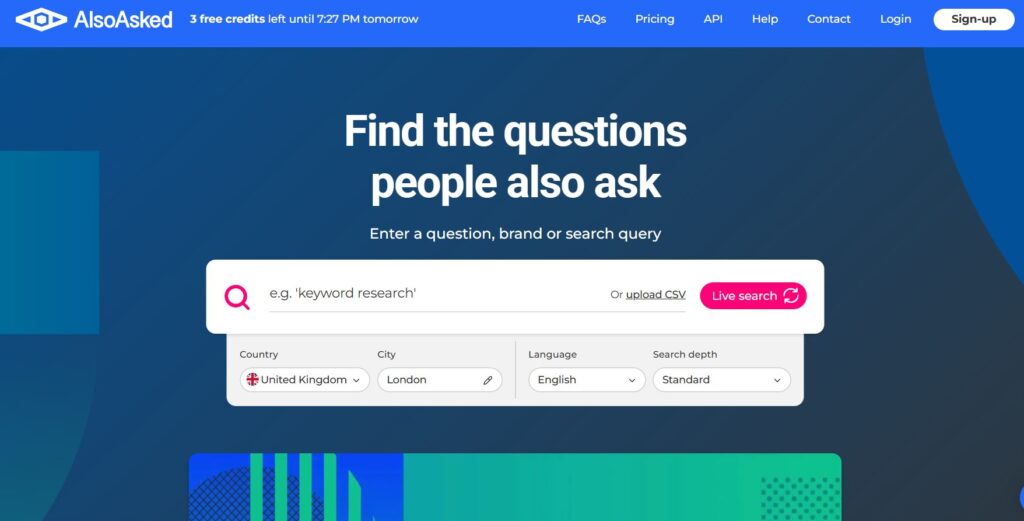
AlsoAsked.com specializes specifically in “People Also Ask” data from Google search results, making it a focused alternative for marketers who want to understand the question sequences users follow during their search journey.
Key Features:
- Visual question trees showing related questions
- Real-time People Also Ask data scraping
- Export functionality for research data
- Search depth control for comprehensive research
- Geographic targeting for localized insights
- API access for automated data collection
Pricing: AlsoAsked offers a free tier with limited searches, while paid plans start at $15/month for individual users and scale to $99/month for agencies.
Best For: Content creators, FAQ developers, and marketers focused on understanding user question patterns.
Pros: Specialized focus on questions, visual question mapping, affordable pricing, real-time data.
Cons: Limited to Google PAA data, narrow feature set, less comprehensive than full SEO suites.
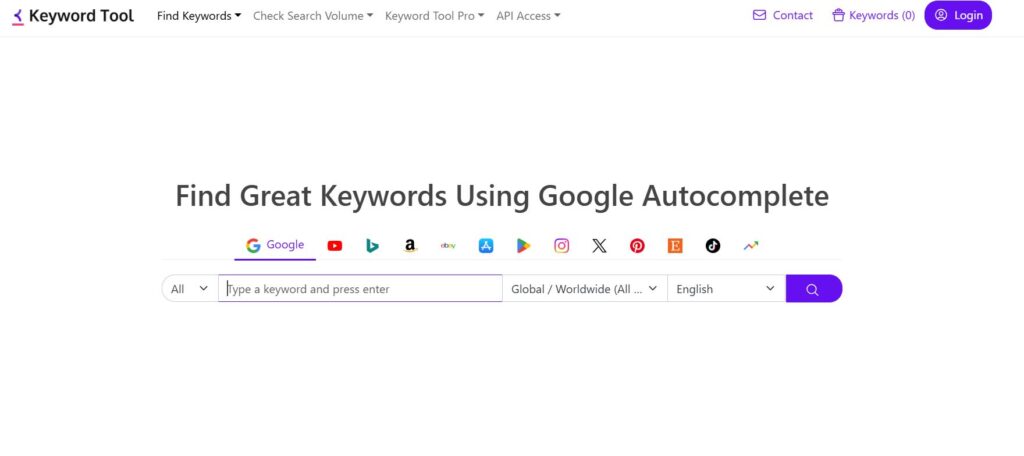
KeywordTool.io distinguishes itself by providing keyword suggestions from multiple platforms including Google, YouTube, Amazon, Bing, and App Store, making it particularly valuable for multi-platform content strategies.
Key Features:
- Multi-platform keyword research (Google, YouTube, Amazon, etc.)
- Autocomplete-based keyword suggestions
- Long-tail keyword focus with question formats
- Language and location targeting
- Negative keyword identification
- Basic search volume data (paid plans)
Pricing: KeywordTool.io offers a free basic version with limited results, while paid plans start at $89/month for Pro and $179/month for Pro Plus.
Best For: Multi-platform content creators, e-commerce marketers, and YouTube content creators.
Pros: Multi-platform coverage, focus on long-tail keywords, simple interface, decent free tier.
Cons: Limited search volume data on free plan, fewer advanced features, higher pricing for full functionality.
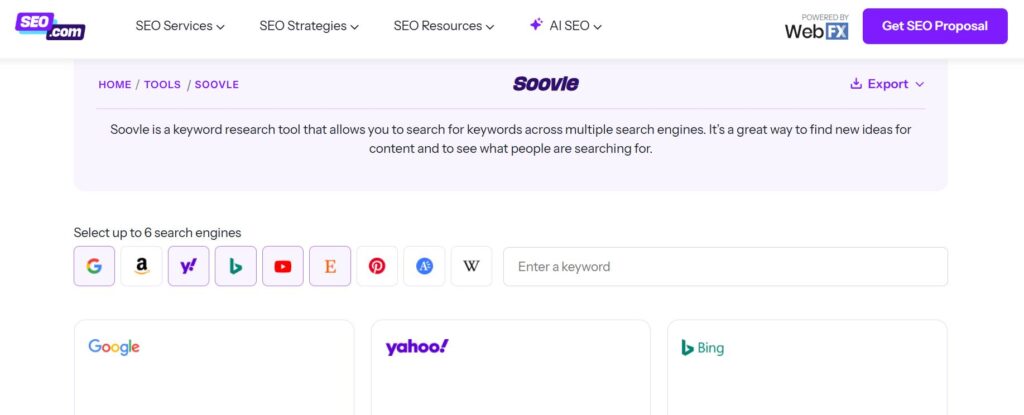
Soovle takes a unique approach by aggregating search suggestions from multiple search engines and platforms simultaneously in a single, clean interface. It’s completely free and offers a quick way to gather keyword ideas across different platforms.
Key Features:
- Real-time search suggestions from multiple platforms
- Simple, distraction-free interface
- Simultaneous searches across Google, YouTube, Amazon, and more
- Customizable search engines selection
- Instant results without registration required
- Keyword export functionality
Pricing: Completely free to use with no limitations or registration required.
Best For: Budget-conscious marketers, quick keyword brainstorming sessions, and users who prefer simple tools.
Pros: Completely free, simple interface, multi-platform coverage, no registration required.
Cons: No search volume data, limited advanced features, basic functionality only.
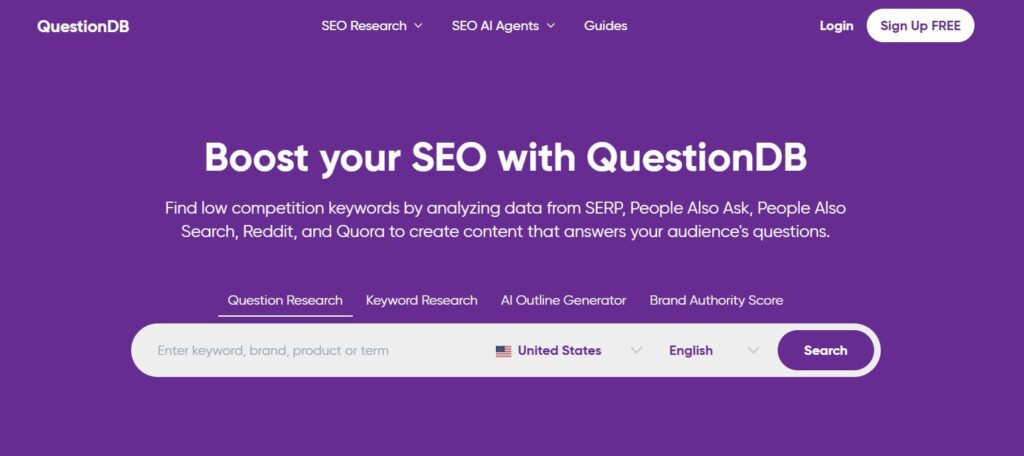
QuestionDB approaches keyword research from a different angle by aggregating real questions that people ask on forums, communities, and Q&A sites. This provides insight into actual user language and pain points.
Key Features:
- Real questions from forums and communities
- Topic clustering and categorization
- Source attribution for context
- Sentiment analysis of questions
- Search and filter functionality
- Export capabilities for research data
Pricing: QuestionDB offers a free tier with limited searches, while paid plans start at $12/month for individual users.
Best For: Understanding customer pain points, community managers, and content creators focused on addressing real user concerns.
Pros: Real user language, unique data source, affordable pricing, insight into customer pain points.
Cons: Limited search volume data, smaller database compared to major tools, newer platform with fewer features.
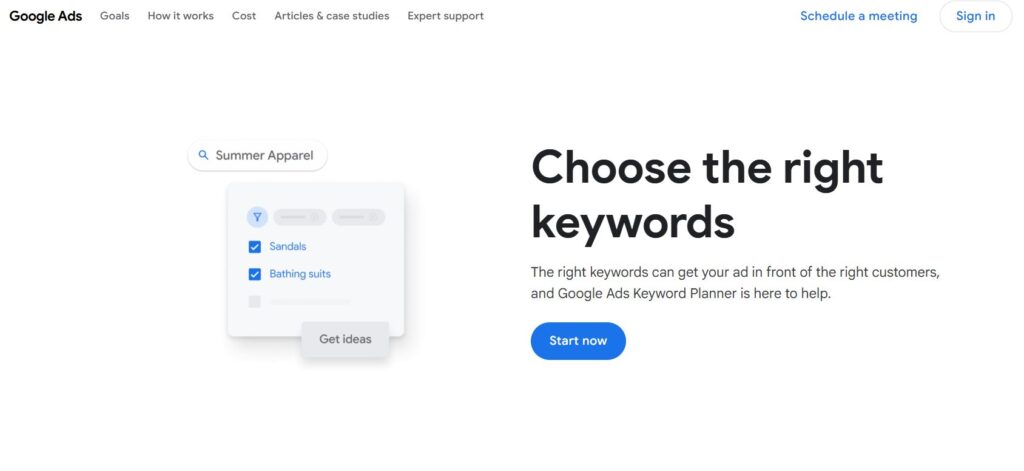
Google Keyword Planner, while primarily designed for Google Ads, remains a valuable free tool for keyword research. It provides direct access to Google’s data and can surface question-based keywords with search volume estimates.
Key Features:
- Direct access to Google search data
- Search volume estimates and trends
- Keyword grouping suggestions
- Geographic and language targeting
- Competition level indicators
- Integration with Google Ads campaigns
Pricing: Free with a Google Ads account (no advertising spend required).
Best For: Google Ads advertisers, budget-conscious marketers, and users who prefer official Google data.
Pros: Free access, official Google data, reliable search volume estimates, integration with Google Ads.
Cons: Requires Google Ads account, limited to Google data, fewer question-specific features, basic interface.
How to Choose the Right Alternative
Budget considerations. If you’re working with limited resources, start with free options like Whazzuup, Soovle, or Google Keyword Planner, or consider tools with generous free tiers like Ubersuggest or AlsoAsked. For established businesses with marketing budgets, investing in comprehensive tools like SEMrush or Ahrefs often provides better long-term value.
Team size and expertise level significantly impact which tool will work best. Solo marketers or small teams often benefit from user-friendly options like Ubersuggest or Whazzuup, while larger teams with SEO specialists can leverage the advanced features of Ahrefs or SEMrush more effectively.
Specific use cases should guide your decision. If you’re primarily creating FAQ content, AlsoAsked.com might be perfect. For multi-platform content strategies, KeywordTool.io’s broad coverage could be ideal. E-commerce businesses might find Ahrefs’ comprehensive database more valuable for competitive analysis. If you want to answer real questions and see distribution options, choose Whazzuup.
Getting Started Tips
Transitioning from Answer the Public to a new tool requires some adjustment, but these tips will help you maximize value from your chosen alternative.
Start with a pilot project using your new tool to research keywords for a specific piece of content or campaign. This helps you understand the interface and workflow without overwhelming yourself with a complete migration.
Export and organize your existing research from Answer the Public before making the switch. This ensures you don’t lose valuable insights and can compare results between tools.
Focus on your core use cases first rather than trying to explore every feature immediately. Master the question research functionality before diving into advanced competitive analysis or additional features.
Set up efficient workflows by creating templates for your keyword research process. Most tools allow you to save searches, create projects, and organize findings in ways that streamline your regular research activities.
Common mistakes to avoid include trying to replicate Answer the Public’s exact workflow in different tools, ignoring search volume data when prioritizing keywords, and choosing tools based solely on price without considering long-term value and feature needs.
Conclusion
The landscape of keyword research tools has evolved significantly, offering marketers more options than ever before. While Answer the Public remains a solid choice for many, these eight alternatives each bring unique strengths to the table.
For small businesses and individual marketers, Ubersuggest offers excellent value with its combination of affordability and comprehensive features. Budget-conscious users will find Soovle and Google Keyword Planner provide solid functionality without cost barriers.
SEO professionals and agencies looking for the most comprehensive data should consider Ahrefs or SEMrush, despite their higher price points. Content creators focused on questions will find AlsoAsked.com perfectly suited to their needs.
Multi-platform marketers should explore KeywordTool.io for its broad coverage, while those interested in community insights will appreciate QuestionDB’s unique approach to real user questions.
The key is matching the tool to your specific needs, budget, and workflow requirements. Most of these alternatives offer free trials or tiers, so you can test them before committing to a paid plan.
Remember that the best keyword research tool is the one you’ll actually use consistently.
The key to successful keyword research isn’t just having the right tool – it’s developing a systematic approach that turns insights into actionable content strategies that drive real business results.
